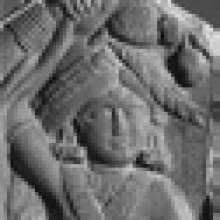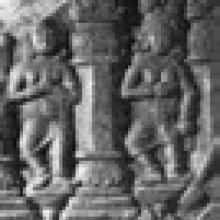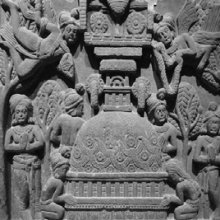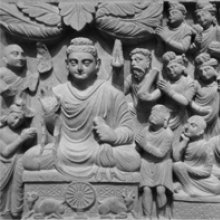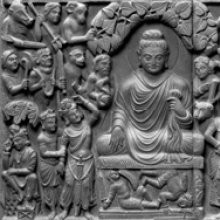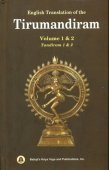State: 2 definitions
Introduction:
State means something in Hinduism, Sanskrit. If you want to know the exact meaning, history, etymology or English translation of this term then check out the descriptions on this page. Add your comment or reference to a book if you want to contribute to this summary article.
Images (photo gallery)
(+55 more images available)
In Hinduism
Yoga (school of philosophy)
Source: ORA: Amanaska (king of all yogas): A Critical Edition and Annotated Translation by Jason BirchThe State (of liberation) is denoted by the Sanskrit term (Mukti) Pada, according to the Amanaska Yoga treatise dealing with meditation, absorption, yogic powers and liberation.—Accordingly, “With palms held together, Vāmadeva bowed his head to the God and asked, ‘tell [us] the means to the state (pada-upāya) of liberation while living?’ [...]’”.

Yoga is originally considered a branch of Hindu philosophy (astika), but both ancient and modern Yoga combine the physical, mental and spiritual. Yoga teaches various physical techniques also known as āsanas (postures), used for various purposes (eg., meditation, contemplation, relaxation).
Languages of India and abroad
Nepali dictionary
Source: unoes: Nepali-English DictionaryState is another spelling for स्टेट [sṭeṭa].—n. state; estate;
Nepali is the primary language of the Nepalese people counting almost 20 million native speakers. The country of Nepal is situated in the Himalaya mountain range to the north of India.
See also (Relevant definitions)
Starts with: No-mind state, State of absorption, State of liberation, State of mind, State of waking, Statement, Stater.
Query error!
Full-text (+14529): Bhava, Svapnavastha, Avastha, Gati, Sthiti, Turiya, Svabhava, Sugati, Dasa, Jagara, Sthana, Nisarga, Brahmavihara, Samadhi, Sahaja, Sayujya, Avasthadvaya, Jagrat, Moha, Yoganidra.
Relevant text
Search found 621 books and stories containing State, States; (plurals include: States, Stateses). You can also click to the full overview containing English textual excerpts. Below are direct links for the most relevant articles:
Mandukya Upanishad (Gaudapa Karika and Shankara Bhashya) (by Swami Nikhilananda)
Mandukya Upanishad, verse 5 < [Chapter I - Agama Prakarana (Scripture)]
Mandukya Karika, verse 4.88-89 < [Chapter IV - Alatashanti Prakarana (Quenching the firebrand)]
Mandukya Karika, verse 1.1 < [Chapter I - Agama Prakarana (Scripture)]
Report of The States Re-Organisation Commission < [October 1955]
Report of The States Re-Organisation Commission < [October 1955]
Centre-State Relations in the Seventies < [January - March 1972]
Pratyabhijna and Shankara’s Advaita (comparative study) (by Ranjni M.)
5.5. States of Experience < [Chapter 3 - The nature of Universe and Individual Self in Pratybhijñā and Advaita]
3. Concept of Jīvanmukta in Pratyabhijñā and Advaita < [Chapter 5 - Concept of Māyā in Pratyabhijñā and Advaita]
5.2. Concept of Pramātā < [Chapter 5 - Concept of Māyā in Pratyabhijñā and Advaita]
Prasthanatrayi Swaminarayan Bhashyam (Study) (by Sadhu Gyanananddas)
1.1. Three Bodies and Three States of the Jīva < [Chapter 3 - Analysis on the Basis of Metaphysics]
2.2. Distinction (form, function, and nature of Īśvaras) < [Chapter 3 - Analysis on the Basis of Metaphysics]
3.2. Three Guṇas of Māyā < [Chapter 3 - Analysis on the Basis of Metaphysics]
The concept of Mind in the Major Upanishads (by Gisha K. Narayanan)
7(b). The Four States of Consciousness < [Chapter 4 - The concept of Mind in the Major Upaniṣads]
7(a). The Concept of Mind in the Māṇḍūkyopaniṣad < [Chapter 4 - The concept of Mind in the Major Upaniṣads]
12. The States of Consciousness in the Upaniṣads. < [Chapter 5 - The Psychological aspects as reflected in the Upaniṣads]
Consciousness in Gaudapada’s Mandukya-karika (by V. Sujata Raju)
Three states of Consciousness: wakeful, dream and deep sleep < [Chapter 3: A Study of Māṇḍūkya Kārikā: Āgama Prakaraṇa]
The falsity of external objects in waking and dreaming states < [Chapter 4: Study of Māṇḍūkya Kārikā: Vaitathya Prakaraṇa]
Further analysis of waking and dream experiences < [Chapter 6: A Study of Māṇḍūkya Kārikā: Alātaśānti Prakaraṇa]
Related products
(+41 more products available)

